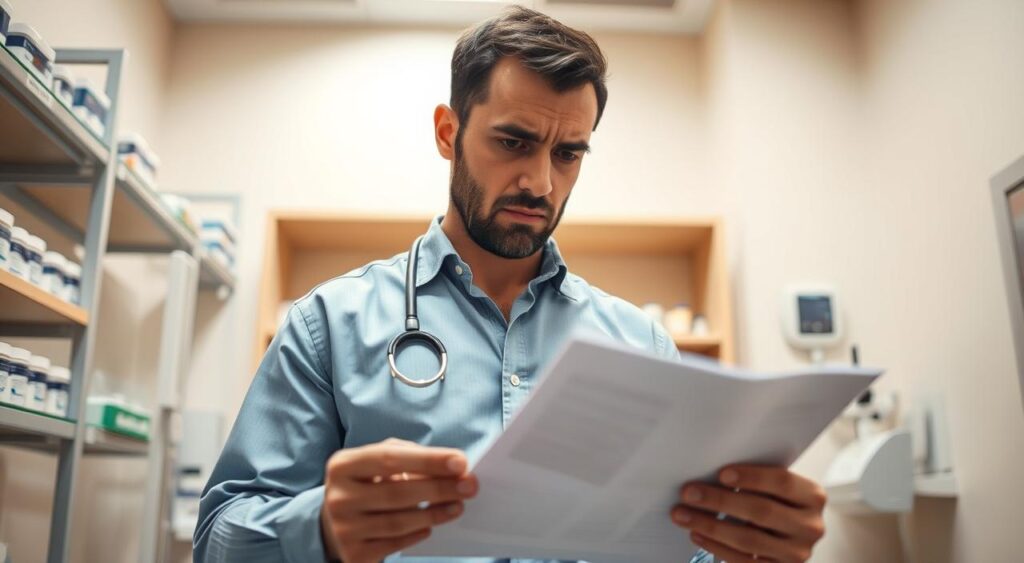Reclaim your intimate life. Effective solutions to overcome Male Hypoactive Sexual Desire Disorder and boost your libido.
Did you know that 1 in 5 men struggle with male hypoactive sexual desire disorder? This condition makes it hard to feel sexual desire, impacting their life and relationships. It’s a common issue affecting many men globally.
Studies show that overcoming hsdd in men needs a detailed plan. It’s important to know the causes, symptoms, and treatments. This knowledge helps men regain their sexual health and happiness.

Male hypoactive sexual desire disorder can deeply affect a man’s life and relationships. It’s vital to get medical help and explore ways to beat this condition.
Key Takeaways
- Male hypoactive sexual desire disorder is a common condition that affects many men worldwide.
- HSDD in men can have a significant impact on relationships and overall wellbeing.
- Understanding the causes, symptoms, and treatment options is crucial in overcoming male hypoactive sexual desire disorder.
- Seeking medical help is essential in addressing hsdd in men.
- A comprehensive approach is necessary to reclaim one’s sexual health and wellbeing.
- Male hypoactive sexual desire disorder is a complex condition that requires patience and understanding.
Understanding Male Hypoactive Sexual Desire Disorder
Male Hypoactive Sexual Desire Disorder (HSDD) is when men don’t feel like having sex. It’s caused by physical, psychological, and emotional factors. This leads to low libido in men. It can really hurt a man’s life, affecting his relationships and how he feels about himself.
HSDD is often tied to sexual aversion disorder. People with this disorder don’t want to have sex and might even avoid it. The DSM-5 says HSDD is when a man doesn’t want sex and it makes him really upset or stops him from living his life.
Definition and Clinical Criteria
The DSM-5 sets the rules for what HSDD is. It says HSDD is when a man doesn’t want sex and it really bothers him or stops him from living his life.
Prevalence in Men
About 1-5% of men have HSDD. But, it’s not talked about much because of the shame around it.
Impact on Quality of Life
HSDD can really mess up a man’s life. It can hurt his relationships and how he feels about himself. Some common problems include:
- Strained relationships with partners
- Decreased self-esteem
- Increased stress and anxiety
- Decreased overall well-being
Common Signs and Symptoms of Low Libido in Men
Low libido in men can stem from many sources. These include hormonal imbalances, certain medications, and health issues. Testosterone deficiency is a big reason, as testosterone is key for sex drive. Men with male sexual dysfunction might feel less interested in sex, have trouble getting an erection, and feel less satisfied.
Some common signs and symptoms of low libido in men include:
- Decreased sex drive
- Difficulty achieving or maintaining an erection
- Reduced sexual satisfaction
- Low testosterone levels
It’s important to tackle low libido in men. It can harm their sexual health and overall well-being. By recognizing these signs, men can start seeking help and improving their sexual health.
Low libido can be treated, and men can regain their sexual health with the right approach.
| Common Causes of Low Libido | Effects on Sexual Health |
|---|---|
| Hormonal imbalances | Decreased sex drive, erectile dysfunction |
| Certain medications | Reduced sexual satisfaction, low testosterone levels |
| Underlying medical conditions | Male sexual dysfunction, decreased overall well-being |
The Science Behind Male Sexual Desire
Male sexual desire is complex, influenced by hormones, neurotransmitters, and psychology. Hormones like testosterone and dopamine are key in sex drive. Sexual desire problems can affect this. Knowing the science helps men and their partners tackle low libido and male arousal disorder.
Hormonal, neurological, and psychological factors mix to cause sexual desire problems. Hormonal imbalances, like low testosterone, can impact desire. The brain’s reward system, affected by male arousal disorder, also plays a part.
Hormonal Factors
Hormones, especially testosterone, are vital for male desire. Low testosterone can lead to sexual desire problems. Dopamine, another hormone, also influences desire, and imbalances can affect male arousal disorder.
Neurological Components
The brain’s reward system is crucial for male desire. It releases dopamine, which boosts pleasure and motivation. This can be impacted by male arousal disorder. Understanding this can lead to better treatments for sexual desire problems.
| Hormone | Role in Male Sexual Desire |
|---|---|
| Testosterone | Regulates sex drive |
| Dopamine | Helps regulate pleasure and motivation |
Risk Factors and Common Causes
HSDD in men, also known as male hypoactive sexual desire disorder, has many triggers. Medical issues like diabetes and heart disease can raise the risk. Understanding these risk factors is key to preventing and managing the condition.
Some common causes of HSDD include:
- Medical conditions: diabetes, cardiovascular disease, and obesity
- Medications: antidepressants and blood pressure medications
- Lifestyle factors: smoking and excessive alcohol consumption
Knowing these risk factors helps in preventing and managing male hypoactive sexual desire disorder. By understanding HSDD causes, men and their partners can find effective treatments. This improves their quality of life.
| Risk Factor | Description |
|---|---|
| Medical Conditions | Diabetes, cardiovascular disease, and obesity |
| Medications | Antidepressants and blood pressure medications |
| Lifestyle Factors | Smoking and excessive alcohol consumption |
Diagnosis Process and Medical Evaluation
To diagnose male sexual dysfunction, including low libido, a detailed medical check-up is needed. This check-up includes a physical exam, a psychological assessment, and lab tests. It aims to find any medical or psychological issues that might be causing low libido.
The first step in diagnosing male sexual dysfunction is a physical exam. It helps find any medical problems that could be linked to low libido. The doctor will look at the patient’s medical history and perform a physical exam to check for signs of health issues.
Components of the Medical Evaluation
- Physical examination: to identify any underlying medical conditions
- Psychological assessment: to identify any underlying psychological or emotional factors
- Laboratory tests: to identify any hormonal imbalances or other underlying medical conditions
Through a thorough medical evaluation, doctors can understand the causes of low libido in men. They can then create a treatment plan to help with male sexual dysfunction.
Getting a proper diagnosis is key to treating low libido in men and male sexual dysfunction. A detailed medical check-up helps find the root causes. It also guides the development of a treatment plan.
Treatment Options for Male HSDD
Men with testosterone deficiency often struggle with sexual desire problems. But, there are many ways to tackle these issues. The right treatment for male Hypoactive Sexual Desire Disorder (HSDD) depends on its cause.
Here are some common treatments:
- Hormone replacement therapy to tackle testosterone deficiency
- Medications, like phosphodiesterase type 5 inhibitors, for sexual desire problems
- Lifestyle changes, like exercise and a healthy diet, for better well-being
It’s crucial to talk to a healthcare provider to create a treatment plan. This plan should address the root causes of HSDD. By exploring these options, men can manage their sexual desire problems and enhance their life quality.

Hormone Replacement Therapy and Medications
Men with male arousal disorder can find relief in hormone replacement therapy and medications. Low testosterone is often the cause of HSDD in men. Hormone therapy replaces the missing hormone with a synthetic or natural one.
This helps restore normal hormone levels and improves sexual function. Testosterone replacement therapy is a common treatment. It can be given through injections, gels, or patches. This increases testosterone levels and boosts libido.
Other medications, like phosphodiesterase type 5 inhibitors, can also help. They treat erectile dysfunction and other sexual health issues related to male arousal disorder.
Benefits and Risks of Hormone Replacement Therapy
Hormone replacement therapy and medications can be effective for HSDD. They can improve libido, increase energy, and enhance overall well-being. But, there are potential risks and side effects.
These can include acne, hair loss, and a higher risk of blood clots. It’s important to talk to a healthcare provider. They can help weigh the benefits and risks and create a treatment plan that’s right for you.
Potential Side Effects of Medications
Men with HSDD should know about the side effects of medications. These can include headaches, dizziness, and nausea. In rare cases, more serious side effects like increased blood pressure or heart problems can happen.
Regular check-ups with a healthcare provider can help manage these risks. This ensures the safe and effective use of medications.
Psychological Approaches and Counseling
Men facing sexual desire issues can find help through psychological methods and counseling. These therapies tackle the emotional and psychological roots of low sexual desire. Techniques like cognitive-behavioral therapy, sex therapy, and couples therapy help build better coping skills and improve relationships.
Seeing a mental health expert can lead to a tailored treatment plan. This plan tackles the emotional and psychological causes of low sexual desire. It offers a full approach to managing these issues. Some main advantages include:
- Improved communication and intimacy with partners
- Development of healthy coping mechanisms for stress and anxiety
- Enhanced self-esteem and body image
- Addressing underlying emotional and psychological factors contributing to HSDD
By adding psychological methods and counseling to their treatment, men can better handle sexual desire problems. This leads to a better life overall.

| Therapy Type | Benefits |
|---|---|
| Cognitive-behavioral therapy | Addresses negative thought patterns and behaviors |
| Sex therapy | Improves sexual function and intimacy |
| Couples therapy | Enhances communication and relationship dynamics |
Lifestyle Changes to Boost Sexual Desire
Making lifestyle changes can help boost sexual desire and treat male hypoactive sexual desire disorder. A healthy diet, regular exercise, and managing stress are key. They are important for addressing low libido in men.
Some key lifestyle changes that can help boost sexual desire include:
- Eating a balanced diet rich in omega-3 fatty acids, vitamin D, and antioxidants
- Engaging in regular exercise, such as aerobic exercise and strength training, to improve cardiovascular health and reduce stress
- Practicing stress management techniques, such as meditation and yoga, to reduce stress and anxiety
- Optimizing sleep patterns to improve overall health and well-being
By making these changes, men can tackle low libido and male hypoactive sexual desire disorder. It’s important to do this with medical treatment and advice from a healthcare professional.
Also, stress management and sleep optimization are key for a healthy lifestyle and boosting sexual desire. By focusing on these, men can enhance their well-being and lessen low libido symptoms.
By adopting these lifestyle changes and getting medical help, men can manage male hypoactive sexual desire disorder. This can greatly improve their quality of life.
| Lifestyle Change | Benefits |
|---|---|
| Healthy Diet | Improves overall health and well-being |
| Regular Exercise | Reduces stress and improves cardiovascular health |
| Stress Management | Reduces stress and anxiety |
| Sleep Optimization | Improves overall health and well-being |
Supporting Your Partner Through HSDD
Dealing with male sexual dysfunction needs empathy and understanding. If your partner has sexual desire problems, make a safe space to talk. This can really help.
Helping your partner get medical help and going with them is good. Creating a treatment plan together can improve intimacy. It also makes your relationship better.
- Open and honest communication about their feelings and desires
- Encouraging them to seek medical help and offering to accompany them to appointments
- Developing a personalized treatment plan that addresses the underlying causes of HSDD
- Working together to implement lifestyle changes that can help improve intimacy and overall relationship satisfaction
Supporting each other can help you both overcome male sexual dysfunction. Remember, sexual desire problems are common. The right support can make a big difference.
| Support Strategies | Benefits |
|---|---|
| Open communication | Improves intimacy and understanding |
| Medical help | Addresses underlying causes of HSDD |
| Lifestyle changes | Enhances overall relationship satisfaction |
Supporting a partner with HSDD requires empathy, understanding, and a willingness to work together to find solutions.
Conclusion: Reclaiming Your Sexual Health and Wellbeing
Overcoming male hypoactive sexual desire disorder (HSDD) needs a team effort. Men should work with a healthcare provider to create a treatment plan. This teamwork is key to getting back to good sexual health.
A good treatment plan might include hormone therapy, medicine, or counseling. Making healthy lifestyle choices, like eating well and exercising, also helps. Remember, HSDD is treatable, and getting medical help is the first step.
By tackling HSDD head-on, men and their partners can strengthen their bond. They can also feel more confident in their sex lives. With the right care and support, men can overcome HSDD and enjoy a fulfilling sex life. Taking care of their sexual health is the first step to a happier, healthier life.
FAQ
Q: What is Male Hypoactive Sexual Desire Disorder (HSDD)?
A: Male Hypoactive Sexual Desire Disorder (HSDD) is a condition where men have little to no sexual desire. This can cause a lot of distress or problems in their lives. It’s also known as low libido in men or male sexual dysfunction.
Q: What are the common signs and symptoms of HSDD in men?
A: Signs of HSDD in men include a lack of interest in sex and decreased erectile function. They might also feel less satisfied with sex. Other symptoms can include low testosterone, sexual aversion disorder, and male arousal disorder.
Q: What are the causes of Male Hypoactive Sexual Desire Disorder?
A: The causes of HSDD are complex. Hormonal imbalances, like low testosterone, can play a role. Certain medical conditions, such as diabetes and heart disease, can also contribute. Psychological factors, like depression and anxiety, are other causes. Male sexual dysfunction and sexual desire problems can also lead to HSDD.
Q: How is HSDD diagnosed in men?
A: Diagnosing HSDD in men involves a detailed medical evaluation. This includes a physical exam, psychological assessment, and lab tests. These tests help find any underlying medical conditions that might be causing the problem.
Q: What are the treatment options for Male Hypoactive Sexual Desire Disorder?
A: Treatment for HSDD depends on the cause. It might include hormone replacement therapy, medications like phosphodiesterase type 5 inhibitors, and lifestyle changes. These can include regular exercise and a healthy diet. Testosterone replacement therapy and other medical interventions can also be effective.
Q: Can lifestyle changes help improve sexual desire in men with HSDD?
A: Yes, lifestyle changes can help. A healthy diet, regular exercise, and managing stress can improve sexual desire. These changes can boost overall health and reduce stress and anxiety, which can help with male sexual dysfunction and sexual desire problems.
Q: How can I support my partner who has HSDD?
A: Supporting a partner with HSDD requires empathy and understanding. Create a safe space for them to talk about their feelings. Encourage them to seek medical help. With the right support and treatment, men and their partners can improve their sexual health and wellbeing.
Q: Is HSDD a treatable condition?
A: Yes, HSDD is treatable. Seeking medical help is the first step. By working with a healthcare provider and developing a treatment plan, men and their partners can improve intimacy and regain sexual confidence. Hormone replacement therapy, medications, and lifestyle changes can all help treat male sexual dysfunction and sexual desire problems.
